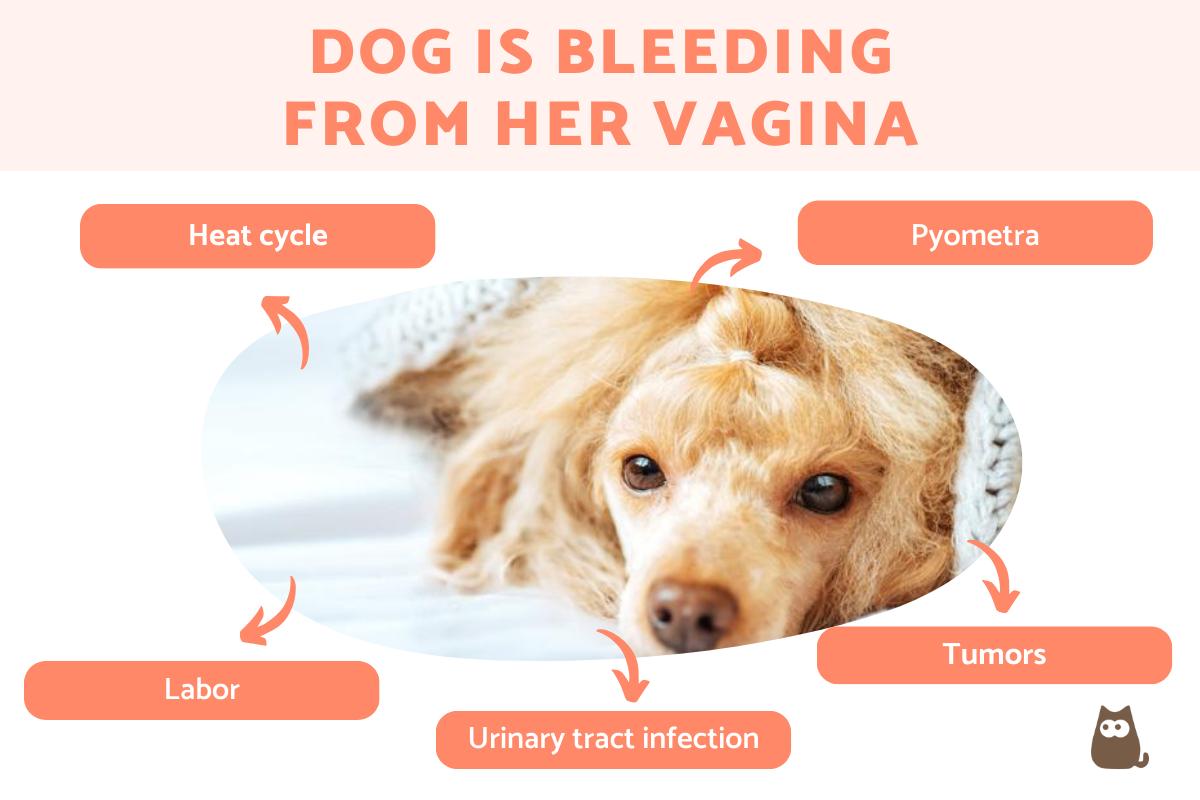Why is My Dog Bleeding From Her Vagina?



See files for Dogs
Any bloody discharge from a dog's vagina can cause concern in their guardian. It is important to note that a sexually intact female dog will bleed from her privates curing her heat cycle, although it should not be profuse. This should not be the case if they have been spayed. It is much less likely for a spayed dog to bleed from her vagina. If this does happen, it is most likely a symptom of a health problem. If your dog is a female more than 6-8 months of age that has not been sterilized, we can expect some bleeding during the estrus cycle. Any other time we see bloody discharge, it is a problem. At AnimalWised, we explain what they might be by asking why is my dog bleeding from her vagina?
Do dogs bleed during their heat cycle?
The first explanation as to why a female dog is bleeding from her vulva is that she is in heat. Female dogs have a reproductive cycle that can be divided into four phases. They are the following:
- Proestrus: the dog is not fertile, but she is preparing for this period by releasing hormones. These can cause swelling of the vaginal area, as well as bleeding or bloody discharge. Dog spotting can be seen when there is blood on the ground where they sit.
- Estrus: it is during this time the dog is fertile. It can last between 3 to 17 days, but the dog should not bleed. They will want to find a mate and develop various behavioral changes.
- Diestrus: differs depending on whether fertilization has occurred. Their character stabilizes and they can even start lactating. If they are pregnant, gestation of fetuses occurs.
- Anestrus: a period of sexual inactivity either after she has given birth to puppies or if the heat cycle has otherwise finished. Bleeding from the vagina should not occur during this stage.
Heat begins in dogs at 6-8 months of age and is sometimes able to manifest earlier in smaller dogs or later in breeds of a larger size. The heat cycle is repeated a couple of times a year, i.e. it occurs approximately every 6 months. In younger females up two years of age, irregularities may appear in the cycle.
Generally the changes which the female dog experiences both physically and behaviorally resolve naturally without need of any intervention. In a healthy dog, it is likely she will bleed from her private parts simply because she is in the proestrus cycle of her heat period. However, she should not bleed during any other part of her heat cycle. If this occurs, you will need to determine the cause. If she is in pain, has purulent discharge or other symptoms, it may be a veterinary emergency.
If a dog is bleeding through the vulva not in heat and is sterilized, it could also be related to her estrus cycle. If a dog is bleeding even though she has been spayed, it is possible she has an ovarian remnant. Even if it is small, it can cause sufficient hormone release to initiate the heat cycle. This is relatively rare, so it is more likely the dog is bleeding from her vagina for the reasons below.
My sterilized dog is bleeding from her vagina
If your unsterilized dog is bleeding from her vagina during heat, it is most likely due to the estrus cycle. If your dog hasn't been spayed, it could be due to an ovarian remnant, but it is more likely due to another issue.
One of the most serious issues of this kind is known as pyometra in dogs. Pyometra occurs when there is an infection of the uterus. The infection manifests in two forms, either open or closed. In open pyometra, you are more likely to see the dog bleeding from her vagina. This is because blood, pus and other fluids can flow from the open cervix.
Dogs with closed pyometra won't necessarily bleed from their vagina at the beginning. In fact, the fluid will likely build up because it cannot exit through the cervix. This is very dangerous and can be life threatening to the dog. We will likely see the dog's belly become swollen, they will have an increased water intake and it will eventually become very painful in the lower abdomen. By the time they are bleeding from their vulva, the pyometra is likely advanced.
Other infections in the uterus or the sexual organs of spayed dogs may also result in bleeding. These can be due to bacterial infections, whereas pyometra seems to have more of a hormonal influence. It is also possible for spayed dogs to get pyometra, but only when they have ovarian remnants. It is very uncommon.

My pregnant dog is bleeding from her vagina
Bleeding may be related to another cause if our dog is pregnant. The emission of blood through the vulva during pregnancy can indicate serious problems such as a potential miscarriage. Dogs should not bleed from their vulva during pregnancy, so you will need to take them to the veterinarian immediately.
The only exception for healthy bleeding during pregnancy is when it is a sign the dog is about to go into labor. If our dog is in the final stretch of gestation, light bleeding from the vulva accompanied by mucus and other fluids may indicate that the time of delivery is approaching. During the development of the pregnancy, light bleeding is normal as long as it is not an excessive amount. Excessive bleeding is a reason for veterinary consultation.
My dog's vagina is bleeding after giving birth
Once the birthing process is over, bleeding from the vulva is normal. These are the secretions known as lochia, which should remit with the passage of time. Other than the dog spotting a little, if the dog continues to bleed significantly 24 hours after labor, they give off a bad odor, there is purulent discharge or your dog has a fever, you should consult a veterinarian.
Blood in female dog's urine
Sometimes, the origin of blood is not in the reproductive system but in the urinal tract. Your animal could be bleeding due to a urine infection in dogs. In this case the bleeding would be of low intensity and is observed as only a few drops at the beginning or end of urination. Our dog will have more symptoms such as straining when urinating, increase in urination frequency and pain.
Urinary tract infections in dogs can be viral or fungal, but it is much more common for them to be bacterial. Treatment requires veterinary treatment and can be diagnosed by analyzing a urine sample. We may need to collect this ourselves using a special cup which we can be bought at any pharmacy. If this is not possible, your veterinarian can do this for you. Treatment for a urine infection usually consists of administrating antibiotics to the dog, but they need to be specific to the bacteria.
Other reasons why your dog may pee a little blood include cystitis, urinary stones and even poisoning. The more blood in the urine, the darker it will be, but any amount requires veterinary consultation.
Other causes of female dog bleeding
If the previous causes have been ruled out, it is possible that your dog will bleed through the vulva due to a neoplasm (tumor) in the vaginal-vulvar area. This is an over-proliferation of cells which can be either benign or malign. They can also cause bleeding in urine if the tumor is located on or near the urinary tract.
Tumors of the reproductive, urinary or other bodily symptoms can grow large enough to be felt via palpation. If they are near the vulva, they can even prolapse. This situation is more likely to occur in older and larger females, although this does not mean that it can not affect younger female dogs.
Neoplasias are often accompanied by frequent urination, constant licking of the private area or inflammation. In this, surgical extirpation would normally be recommended. If the tumor is cancerous and has metastasized, it is also possible the dog will require chemotherapy. Treatment options will be determined by your veterinarian.

My female dog is dripping blood
As we have stated throughout this article, we can expect some bleeding from a dog's vagina if she is in heat. This tends to be in the form of spotting. Spotting occurs when small amounts of blood seep out. We often see spots of blood on surfaces such as the floor or couch where the dog has been sitting. This can be exacerbated if the dog is rubbing her privates as a way to relieve frustration. It is also why we may need to keep her off soft furnishings during this time.
If a female dog is dripping blood from her vagina, even if she is in heat, it is likely a more serious problem. The vaginal or uterine tissue could be infected or damaged. Dripping is not the same as spotting and the more bloody discharge there is, the more likely a serious health problem is the cause. You should not hesitate to go to a veterinarian if you observe this symptom in your dog.
This article is purely informative. AnimalWised does not have the authority to prescribe any veterinary treatment or create a diagnosis. We invite you to take your pet to the veterinarian if they are suffering from any condition or pain.
If you want to read similar articles to Why is My Dog Bleeding From Her Vagina?, we recommend you visit our Other health problems category.






 What type of dog is this one
What type of dog is this one


 About 5 days ago my dog who has been recently fixed she just started bleeding from her vagina yesterday and has no appetite and little energy
About 5 days ago my dog who has been recently fixed she just started bleeding from her vagina yesterday and has no appetite and little energy

 Blooding in yoni
Blooding in yoni


